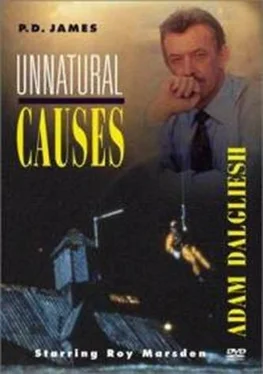P James - Unnatural Causes
Здесь есть возможность читать онлайн «P James - Unnatural Causes» весь текст электронной книги совершенно бесплатно (целиком полную версию без сокращений). В некоторых случаях можно слушать аудио, скачать через торрент в формате fb2 и присутствует краткое содержание. Жанр: Детектив, на английском языке. Описание произведения, (предисловие) а так же отзывы посетителей доступны на портале библиотеки ЛибКат.
- Название:Unnatural Causes
- Автор:
- Жанр:
- Год:неизвестен
- ISBN:нет данных
- Рейтинг книги:4 / 5. Голосов: 1
-
Избранное:Добавить в избранное
- Отзывы:
-
Ваша оценка:
- 80
- 1
- 2
- 3
- 4
- 5
Unnatural Causes: краткое содержание, описание и аннотация
Предлагаем к чтению аннотацию, описание, краткое содержание или предисловие (зависит от того, что написал сам автор книги «Unnatural Causes»). Если вы не нашли необходимую информацию о книге — напишите в комментариях, мы постараемся отыскать её.
Unnatural Causes — читать онлайн бесплатно полную книгу (весь текст) целиком
Ниже представлен текст книги, разбитый по страницам. Система сохранения места последней прочитанной страницы, позволяет с удобством читать онлайн бесплатно книгу «Unnatural Causes», без необходимости каждый раз заново искать на чём Вы остановились. Поставьте закладку, и сможете в любой момент перейти на страницу, на которой закончили чтение.
Интервал:
Закладка:
“No dear,” said Latham easily. “I’m very particular what I carry in the boot of my Jaguar.”
Celia said complacently: “Well, I’m in the clear. Sylvia can give me an alibi until late on Tuesday and that’s obviously the crucial time. I admit that I was out alone on Wednesday night but Reckless will hardly suspect me of mutilating the body. And that reminds me. There’s one person who doesn’t even claim an alibi for Tuesday or Wednesday, Jane Dalgliesh. And what’s more-it was her chopper!”
Latham said: “Why in God’s name should Miss Dalgliesh wish to kill Seton?”
“Why should any of us want to?” retorted Celia. “And I’m not saying she did. I’m merely pointing out that it was apparently her chopper.”
Bryce said happily: “I wanted to at one time. Murder Seton, I mean. After I found Arabella I could willingly have killed him. But I didn’t. All the same, I can’t feel sorry about it. I wonder if I ought to ask to view the body after the inquest. It might shock me out of this insensitivity which I can’t feel is at all healthy.”
But Latham was still meditating on the missing chopper. He said fiercely: “Anyone could have taken it! Anyone! We all walk in and out of each other’s houses at will. No one here locks up anything. There’s never been the need. And we don’t even know yet that it was the weapon.”
“My dears,” said Bryce. “Consider this and calm yourselves. Until we know the cause of death we can’t even be sure that Maurice was murdered.”
9
They left her at the door of Rosemary Cottage and she watched them disappear into the night. Justin’s high voice and Latham’s laugh came back to her long after their figures had merged with the darker shadows of hedgerow and tree. There were no lights in the cottage and the sitting room was empty. So Elizabeth was in bed. She must have driven home fast from Tanner’s Cottage. Her aunt was uncertain whether to be glad or sorry. She had a sudden need of company but she couldn’t face questions or arguments. There would be much to discuss, but not tonight. She was too tired. She switched on the table lamp and, kneeling on the hearth rug, poked ineffectually at the slates and ashes of the dead fire. Then she got unsteadily to her feet, grunting with the effort like an old woman, and let herself down into an armchair. Opposite her an identical chair loomed squat and solid, plump with cushions, empty and poignant. Here Maurice had sat on that October afternoon six years ago. It was the day of the inquest; a day of cold and sudden squalls. There had been a good fire that evening. She had been expecting him and had taken care that both she and the room were ready. The firelight and the one discreet lamp had shed a nicely calculated glow over the polished mahogany and cast soft shadows on the soft pinks and blues of cushions and carpet. The tray of drinks had been set ready to hand. Nothing had been left to chance. And she had waited for him as eagerly as a young girl before her first date. She had worn a dress of soft blue-grey wool. It had really made her look quite slim, quite young. It still hung in her wardrobe. She had never cared to wear it again. And he had sat opposite her, stiff and black in his formal mourning, an absurd little mannikin with his black tie and armband, his face rigid with grief. But she hadn’t understood then that it was grief. How could she? It was impossible that he could be grieving for that shallow, egotistical, monstrous nymphomaniac. Of course, there had been the shock of hearing that Dorothy was dead, had killed herself, the horror of identifying the drowned body, the ordeal of the inquest, of facing the rows of white, accusing faces. He knew what they were saying all right, that he had driven his wife to suicide. No wonder he had looked shocked and ill. But grief? It had never occurred to her that he might grieve. Somehow she had taken it for granted that there must, in his heart, have been a spring of relief. Relief that the long years of torment and self-control were over at last, that he could begin to live again. And she would be there to help him, just as she had helped with her sympathy and advice when Dorothy was alive. He was a writer, an artist. He needed affection and understanding. From tonight he need never be alone ever again.
Had she loved him, she wondered. It was difficult to remember. Perhaps not. Perhaps it had never been love as she imagined love to be. But it had been as close as she would ever get to that longed-for, elusive, oft-imagined cataclysm. She had dealt with its counterfeit in nearly forty novels; but the coin itself had never come within her grasp.
Sitting in front of the dead fire she recalled the second when she had known the truth, and her cheeks burnt at the memory. Suddenly he had begun to cry, awkwardly as a child. In that moment all artifice had been forgotten. Only pity remained. She had knelt beside him, cradling his head in her arms, murmuring her comfort and love. And then, it had happened. His whole body stiffened and withdrew. He looked at her, catching his breath, and she saw his face. It was all there. Pity, embarrassment, a trace of fear and-hardest of all to accept-physical repulsion. In one bitter moment of complete clarity she had seen herself with his eyes. He had been grieving for that slim, gay, beautiful creature; and an ugly middle-aged woman had chosen that moment to throw herself into his arms. He had recovered himself, of course. Nothing had been said. Even the dreadful sobbing had been cut off in mid-gasp like that of a child suddenly offered a sweet. She reflected bitterly that there was nothing like personal danger to take the edge off grief. Somehow, gracelessly, she had stumbled back to her own chair, her face burning. He had stayed for as long as politeness dictated and she had handed him his drinks, listened to his sentimental reminiscences about his wife-dear God, had the poor fool forgotten so soon?-and feigned interest in his plans for a long holiday abroad, “to try to forget.” It was six months before he had thought it prudent to revisit Rosemary Cottage alone and even longer before he began tentatively to establish the understanding that she would be available whenever he wanted to escort a woman in public. Just before he left for his holiday he had written to tell her that she was named in his will “in appreciation of her sympathy and understanding on the death of my dear wife.” She had understood all right. It was the kind of crude, insensitive gesture which he would consider an adequate, appropriate apology. But her first reaction hadn’t been anger or humiliation; she had merely wondered how much it would be. Since then she had wondered increasingly, and now the question had a fascinating immediacy. It might, of course, be a mere hundred or so. It might be thousands. It might even be a fortune. After all, Dorothy was reputed to have been a wealthy woman and Maurice hadn’t anyone else to leave it to. He had never had much use for his half-brother and lately they had grown even further apart. Besides, didn’t he owe it to her?
A slant of light from the hall fell across the carpet. Silently, Elizabeth Marley came into the room, her feet bare, her red dressing gown glowing in the half-light. She stretched herself out stiffly in the chair opposite her aunt, her feet towards the dying fire, her face deep in the shadows. She said: “I thought I heard you come in. Can I get you anything? Hot milk? Ovaltine?”
The tone was ungracious, embarrassed, but the offer was unexpected and Miss Calthrop was touched.
“No thank you, dear. You go back to bed. You’ll catch cold. I’ll make the drink and bring yours up.”
The girl did not move. Miss Calthrop made a fresh attack on the fire. This time a tongue of flame hissed round the coals and she felt the first welcome warmth on hands and face. She asked: “You got Sylvia home all right? How did she seem?”
Читать дальшеИнтервал:
Закладка:
Похожие книги на «Unnatural Causes»
Представляем Вашему вниманию похожие книги на «Unnatural Causes» списком для выбора. Мы отобрали схожую по названию и смыслу литературу в надежде предоставить читателям больше вариантов отыскать новые, интересные, ещё непрочитанные произведения.
Обсуждение, отзывы о книге «Unnatural Causes» и просто собственные мнения читателей. Оставьте ваши комментарии, напишите, что Вы думаете о произведении, его смысле или главных героях. Укажите что конкретно понравилось, а что нет, и почему Вы так считаете.












